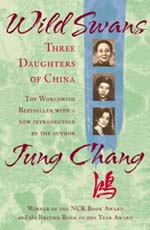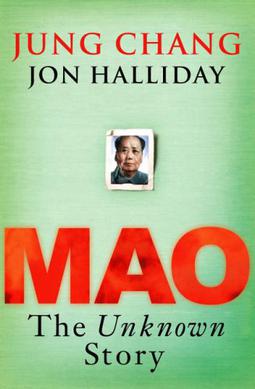This is an old revision of this page, as edited by John Smith's (talk | contribs) at 01:30, 25 June 2005 (Book pics; other edits). The present address (URL) is a permanent link to this revision, which may differ significantly from the current revision.
Revision as of 01:30, 25 June 2005 by John Smith's (talk | contribs) (Book pics; other edits)(diff) ← Previous revision | Latest revision (diff) | Newer revision → (diff)Jung Chang (张戎, 1952 - present) is the celebrated British-Chinese historian and author of several books concerning Chinese history, mostly widely known for the internationally applauded Wild Swans. Born in China, Chang travelled to the United Kingdom to study there, eventually marrying and settling there.
Life in China
The Basics
Chang was born on the 25th March, 1952 in Yibin, Sichuan Province, China. She was the daughter of Communist Party officials and had several siblings. Due to her father's interest in books, she quickly developed a love of literature, writing her own poetry as a child.
Her family and Communism
At first life was relatively good for her family, as her parents worked hard, her father becoming especially successful at regional level. However during the failures of the Great Leap Forward and the turmoil of the Cultural Revolution, things took a turn for the worse. Her mother and father, rather than simply go along with Mao Zedong's policies, did their best to protect those who suffered, her father criticising Mao during the Cultural Revolution. Thus they opened themselves up to retaliation from Mao's supporters, both being publicly humiliated, imprisoned and abused. Her father was treated especially badly, such that he suffered from lasting physical and mental illness.
Chang originally loved Mao, but the events of her early life shattered these feelings. She still respects leaders such as Liu Shaoqi and Zhou Enlai. But she realised how brutal Mao's control of China was and the destructive influence the Party was having by following him. When she heard about his death, she wrote in Wild Swans that felt that she had to bury her head in the shoulder of another student to pretend she was grieving - she could not mourn his passing but did not want to singled out for criticism for not doing so. Her view of how Mao was mourned in China was thus:
- The Chinese seemed to be mourning Mao in a heartfelt fashion. But I wondered how many of their tears were genuine. People had practiced acting to such a degree that they confused it with their true feelings. Weeping for Mao was perhaps just another programmed act in their programmed lives.
Learning English
Like many of her peers Chang became a Red Guard, though for only a short period of time - in her eyes they were simply violent bullies. She was stopped from going to university after the Cultural Revolution started, so she spent several years as a barefoot doctor, a steelworker and an electrician. She received no training as a doctor or electrician due to Mao's disdain for education. Fortunately the universities were eventually re-opened and she was able to gain a place at Sichuan University to study English, later becoming an Assistant lecturer there. After Mao's death, the opportunity presented itself to study in the West through national examination. She passed and, after her father was rehabilitated, her application was approved.
Life in Britain
Chang left China in 1978, staying first in Soho, London. She later moved to Yorkshire, studying Linguistics at the University of York - she lived in Derwent College, in the block nearest to Heslington Hall. She received a Ph.D. in Linguistics from York, becoming the first person from the People's Republic of China to be awarded a Ph.D. at a British university. On Tuesday 14th June 2005, she returned home to her old university, addressing York's Debating Union. Hundreds of students turned out to meet her, including dozens of Chinese exchange students.
She has also been awarded honorary doctorates from universities of Buckingham, York and Warwick and the Open University. She lectured for some time at the School of Oriental and African Studies in London, before she retired in the 1990s to concentrate on her writing.
Life in Britain was an incredible experience to her after the repression of the 1960s and 1970s in China, even finding colourful window-boxes worth writing home about - Hyde Park and the Kew Gardens were inspiring. Originally she (and other Chinese) had mistakenly believed that British pubs were similar to pole-dancing strip joints. Having summonded the courage to dive inside a nearby establishment, she was rather disappointed to only find a few old men sipping beer in a smokey room. But after the initial culture-shock, she soon grew to love Britain with the vast variety of cultures, literature and arts that were available to her. She took every opportunity to watch Shakespeare's plays in both London and York - sadly she does not find the time to go to theatre so often now.
Chang married British historian Jon Halliday and currently lives with him in West London.
Publications
- Madame Sun Yat-Sen: Soong Ching-Ling (1986) (co-author: Jon Halliday)
- Wild Swans: Three Daughters of China (1991)
- Mao: The Unknown Story (2005) (co-author: Jon Halliday)
Wild Swans

The international bestseller was a biography of three generations of Chinese women in 20th century China - her grandmother, mother and herself. Chang paints a vivid picture of the political and military turmoil of China in this period, from the marriage of her grandmother to a warlord, to her mother's experience of Japanese-occupied Jinzhou during the Sino-Japanese War and her own experience of the chaos caused by Mao's policies of the 1950s and 1960s.
It is the largest grossing non-fiction paperback in publishing history, selling over 10 million copies worldwide and has been translated into 30 languages. Wild Swans has received much praise throughout the literary community, especially from authors such as JG Ballard. However its sale is banned in China, though translations are available in Hong Kong and Taiwan.
Mao: The Unknown Story

Jung Chang's latest work, a biography of Mao, was written by both Chang and her husband Jon. It goes further than any other work on Mao in criticising his control of the CCP and his rule of China. According to Chang and Halliday, although Mao had been born a peasant, he had no interest in the welfare of Chinese peasants - he boasted that he was willing “for half of China to die” to achieve military-nuclear superpowerdom. He deliberately exported food from China during a famine that he played a part in creating (by ordering the peasants out of the fields and into the factories). Mao also arrested and murdered many of his political opponents, including some of his closest friends. In short they expose him as a far more tyrannical leader than anyone previously dared to suppose.
There are those who criticise this portrail of Mao. British author Philip Short, who wrote his own biography of Mao (1999), argued that Chang distorted him from a complex historical character into a 'cardboard cutout of Satan' and that she was 'writing history to fit her views'.
Chang responded that nothing positive ever came out of Mao's rule and that she and her husband had been shocked by what they had discovered. Her husband is one of Britain's most respected experts on Soviet history, and he spent years travelling abroad to access Russian archives that were unaccessible until recently. When asked about the Chinese leader, Soviet leader Nikita Khrushchev said: “I look at Mao, I see Stalin, a perfect copy.” Chang herself travelled many times to China, interviewing those who had been close to Mao, as well as eyewitnesses to events such as the crossing of Luding Bridge. According to her, the latter was a fabrication made for propagandist value. All in all, this book took ten years to write.
If Chang's estimate of 70 million deaths is correct, it means that Mao was responsible for more human suffering than either Hitler or Stalin. Thus her work deserves serious study.